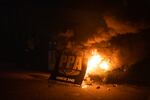When negotiators for the city of Portland and the Portland Police Association resume contract negotiations Wednesday, they will be stepping into an arena that has changed dramatically since negotiations paused in February due to the pandemic.
The current contract was set to expire in June 2020, though the City Council voted unanimously to extend it one year.

Over the summer, racial justice protesters directed a lot of their focus on the Portland Police Association headquarters, arguing the union was a major hurdle to holding police officers accountable.
Jonathan Levinson / Jonathan Levinson
Not only has the pandemic gutted the city’s budget — all bureaus, including the Portland police, were forced to cut 5.6% from their general fund budgets — but the police bureau had an additional $15 million cut from its budget in the wake of racial justice protests in 2020 focused largely on racist policing and police violence.
Those protests also rallied Portlanders and raised awareness across a broad cross-section of the community about a litany of inequities in the criminal justice system, many of which begin with the police.
At the heart of the current debate about how to hold police more accountable is one document: the police union contract. Advocates for changes in policing say the Portland contract has been carefully constructed over the years to shield officers from discipline and prevent the public from knowing when officers are disciplined.
They also say now is the time to make significant changes.
Voter approved, attorney disputed
Negotiations over the police union contract are expected to come into direct conflict with the will of Portland voters, who passed a measure in November to create a new police oversight board with an overwhelming 81% of voters supporting it.
Among other changes, the new board would be empowered to investigate deadly use of force and have the ability to fire officers. That’s proving to be a sticking point before contract negotiations have started.
Two days after the election, the police union filed a grievance with the city and police bureau, arguing that the proposed oversight board violated state law mandating that disciplinary practices, among other things, must be negotiated with union representatives.
“The City is well-aware that it cannot escape its bargaining obligations by sending mandatorily negotiable subjects, such as a new disciplinary system for (Portland Police Association) members, to voters for a (city) Charter change without first reaching agreement with the PPA over those changes,” the grievance reads.
Unite Oregon, a coalition of people aimed at improving racial and economic justice for people of color, immigrants, refugees and people from low-income backgrounds, issued a statement outlining demands for the upcoming negotiations. The statement, with more than 30 signatories, voiced support for organized labor and the importance of negotiating working conditions. But, the statement rejected the notion that accountability and oversight constitute working conditions.
“The unions often see an attempt at increased oversight and accountability as an anti-police movement or an anti-police sentiment,” said Ashlee Albies, attorney for the Albina Ministerial Alliance Coalition for Justice and Police Reform. “And I think that, ultimately, is what contributes to lack of trust in police. Why wouldn’t you want to be held accountable so that you are clear on what you can and can’t do?”
Union contract negotiations often focus on mundane management issues like vacation policies, pay scales and clothing allowances.
“But when it comes to accountability and oversight, those have wide reaching impacts on public safety and relationships with community,” Albies said. “[PPA] have had excellent legal counsel throughout their existence...And my perception is that they sometimes only have to threaten to challenge certain things and the city will capitulate.”
Bargaining power
The city may take a more resolute position toward changes this time around, however.
As testament to its newfound resolve, the city has hired an outside labor attorney to lead the negotiations, a development Portland Copwatch’s Dan Handelman said suggests the city may finally be treating the police union with the rigor it deserves.
“You can’t just treat this like any other contract negotiation,” Handelman said. “This is a very special kind of employee that can take a human life.”
Handelman, whose organization advocates for more rigorous police oversight, said there’s a sense that with increased involvement from City Council, community input and months of street demonstrations, city negotiators may have more leverage than in the past.

Protesters face police officers along a fence in downtown Portland on June 2, 2020.
Jonathan Levinson / OPB
Besides the voter-approved oversight board, Unite Oregon and other members of the community have demanded changes to create transparency when officers are disciplined, making it easier to fire or discipline officers for excessive force or racism. Police accountability advocates would also like to see changes to the discipline appeals process, which currently goes to binding arbitration.
“I think the people who are already on council recognize that there’s some wind in the sails of this movement for making change,” Handelman said. “It remains to be seen how much that will translate into changes being made. And generally speaking, when the PPA has to give something up, they want something in return.”
Often, what PPA wants is more pay for its officers.
In 2016, PPA agreed to give up a rule allowing officers 48 hours before being compelled to give statements to internal affairs after a deadly shooting in exchange for officers receiving a 9% raise.
“But right now, especially under COVID, there’s not that much money to throw around,” Handelman said. “So I don’t know what other kinds of things the city can do.”
Newly elected PPA president Brian Hunzeker said the Portland Police Bureau is drastically understaffed and fixing that is one of his top priorities.
“We need to actually invest in the police,” Hunzeker said. “And when I say invest, I’m not asking for millions of dollars to come into the police. I’m asking for an investment in us to allow us the ability to help fix the problems in the community. Invest in us to get our staffing levels where they should be.”
The Portland Police Bureau, already a lean organization compared to departments in similar size cities, has faced a slew of retirements and departures over the past year, leaving it even more understaffed. The bureau had 882 sworn members of all ranks as of September, out of an authorized 917 positions. Of those, 616 were officers and 100 had not yet been trained or were on probation.
And while the union and PPB say the recent surge in shootings and homicides is connected to the staffing shortage, research has not found a connection between more police officers and reduced crime rates.
Foreshadowing an impending standoff as discussions turn to oversight, Hunzeker said Portland officers already face robust oversight.
“We have more levels of community member oversight and review, I would bet, than any other agency in the country,” said Hunzeker, who believes voters did not understand the issues when they voted for the oversight board in November. “You have to trust your vote from the leaders that we have elected. The leaders that have been elected are responsible to hire and put in place the people that are given the ability to review the police.”
Outside arbitration
The current contract allows the police union to appeal disciplinary decisions to an outside arbitrator empowered to overturn the decision. The arbitrator’s decision is binding and can’t be appealed. As a result, the ultimate decision to discipline or fire police officers doesn’t lie with the police chief, police commissioner, the city council or a citizen oversight committee. That power lies with an outside arbitrator who isn’t accountable to voters.
Despite the voter-passed oversight measure, Hunzeker said police union critic and former Commissioner Chloe Eudaly’s November loss to PPA-endorsed candidate Mingus Mapps suggests Portlanders are eager for a more moderate stance on police reform.
Still, the political path for a contract favorable to the union may not be so clear.
Mayor Ted Wheeler, who won reelection in November, told OPB’s “Think Out Loud” this week that while police oversight and accountability technically falls under his purview as the police commissioner, the current contract effectively nullifies his power. Wheeler said he would consider a change in that realm as a victory in the upcoming negotiations.

Mayor Ted Wheeler speaks at a press conference Aug. 30, 2020, in Portland, Ore. A man was shot and killed the previous night during clashes between Trump supporters and counterprotesters.
Bradley W. Parks / OPB
“That’s what’s envisioned in the city charter,” Wheeler said. “The expectation is that, ultimately, elected officials and the police chief who are held accountable to the public for the actions of the police bureau would also have the authority and decision making power when it comes to accountability. We do not have that authority right now.”
The city may be getting some help from Salem, as well. State Sen. Lew Frederick, D-Portland, introduced a bill this week carving out a loophole to the state’s collective bargaining laws which would allow voter-approved community oversight boards to oversee disciplinary matters. Frederick said the step is necessary since departments are unable to hold themselves accountable.
“They had promised they were going to solve this years ago, decades ago,” Frederick said. They promised, “that this was not going to be a problem, that they would police themselves and they didn’t.”
If that bill becomes law, many of PPA’s legal objections to the oversight board could dissolve.
